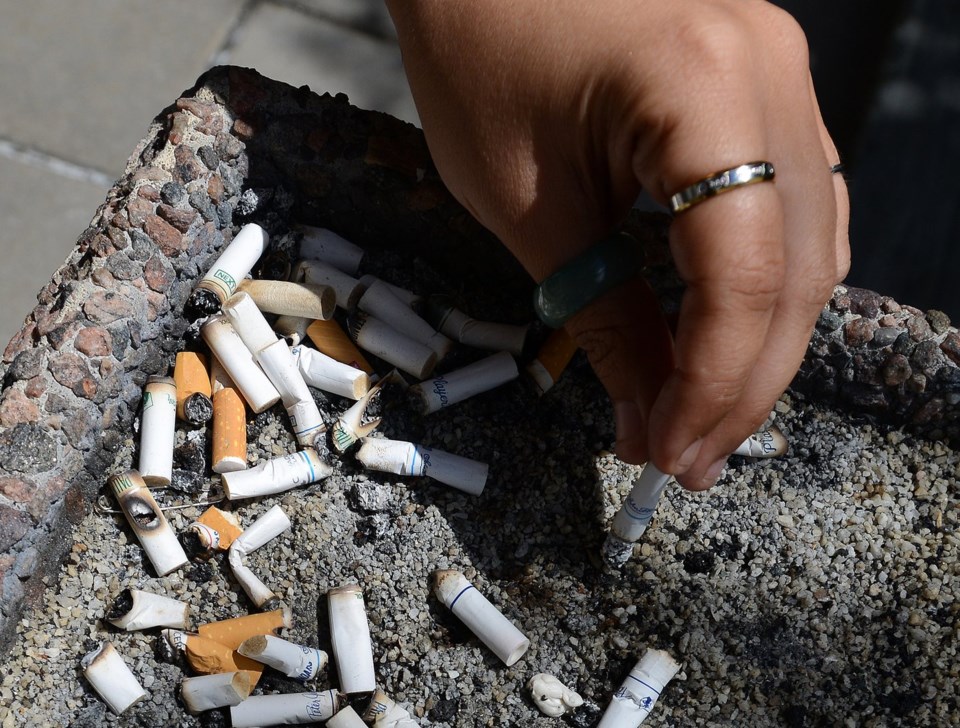MONTREAL — Anti-smoking advocates urged the provinces and territories to use money from a historic tobacco settlement on public health programs as the provinces are set to receive initial amounts starting Friday.
In March, an Ontario judge sanctioned a $32.5-billion plan requiring three major tobacco companies to pay out billions of dollars in compensation to provinces, territories and former smokers.
The settlement was first proposed in October 2024 after years of mediation between the companies — JTI-Macdonald Corp., Rothmans, Benson & Hedges and Imperial Tobacco Canada Ltd. — and their creditors.
That group includes plaintiffs in two Quebec class-action lawsuits as well as provincial and territorial governments long seeking to recoup smoking-related health-care costs.
As the compensation begins to flow with initial payouts on Friday, advocates are calling on the provinces to invest that cash into tobacco-reduction strategies.
Les Hagen, with the Association for Action on Smoking and Health, says the settlement includes no remedial actions — so tobacco will continue to be sold and marketed in Canada without further restrictions.
A small amount can pay huge dividends in keeping the numbers down. Provincial and territorial governments have not forced the inclusion of elements aimed at preventing further harm in the final agreement.
"Just a sliver," Hagen said of the potential investment. "In Alberta, for example, $700 million, that's the initial payment, and if only five per cent of that was reinvested in our tobacco reduction strategy, we would be miles ahead in terms of keeping kids out of the tobacco market."
While the number of smokers in Canada is at its lowest levels, there are still an estimated four million tobacco smokers in the country and about 46,000 Canadians continue every year to die from tobacco-related deaths.
“Without the introduction of new measures limiting the industry’s ability to recruit new customers and without adequate funding to support such initiatives, the agreement negotiated by the provinces and territories will be nothing more than a gigantic cash grab," said Flory Doucas, spokeswoman for the Coalition québécoise pour le contrôle du tabac, adding it will "do nothing to protect future generations from the predatory practices of these companies.”
The landmark settlement will see about $24 billion to provinces and territories over the span of two decades, while plaintiffs in the Quebec lawsuits will get more than $4 billion to split between them, with claims period for those members also opening Friday.
Another $2.5 billion will go to compensate Canadian smokers not included in the lawsuits, and more than $1 billion will go to a foundation to fight tobacco-related diseases.
The money for the foundation also includes $131 million taken from the amount allocated to the Quebec plaintiffs.
The plan was unanimously approved by creditors in December and faced its final hurdle — approval from the court — which was granted in March.
But public health advocates have longed denounced the lack of smoking-reduction measures.
The legal saga started with a landmark ruling in Quebec that ordered the companies to pay about $15 billion to plaintiffs in two class-action lawsuits.
The case migrated to Ontario in 2019 when the companies sought creditor protection after the Quebec ruling was upheld on appeal.
All legal proceedings against the three were put on hold during the negotiations, which were confidential.
The deal is a pan-Canadian settlement of all outstanding tobacco litigation in the country. The companies had faced claims totalling more than $1 trillion, including from lawsuits from provincial governments seeking to recover smoking-related health-care costs as well as other actions.
In a ruling this week, Ontario Superior Court Chief Justice Geoffrey Morawetz signed off on $909 million in legal fees for class-action lawyers who have fought tobacco companies in the courts for the past three decades.
Nearly $900 million of that is for Quebec counsel whose clients are set to receive nearly $4 billion. The payment requested by their lawyers represents 22 per cent of that sum.
"The fee request of $909 million is unheard of in Canadian legal history," the chief judge noted. "As previously stated, this is a unique case and this decision should never be considered to have any precedential value."
But he found no reason to reduce the amount.
"Taking into account the result achieved, risk, complexity and importance of the matter to the class, I am satisfied that the requested fee is reasonable in the circumstances and it is approved," Morawetz wrote in a ruling dated Monday.
This report by The Canadian Press was first published Aug. 27, 2025.
Sidhartha Banerjee, The Canadian Press



